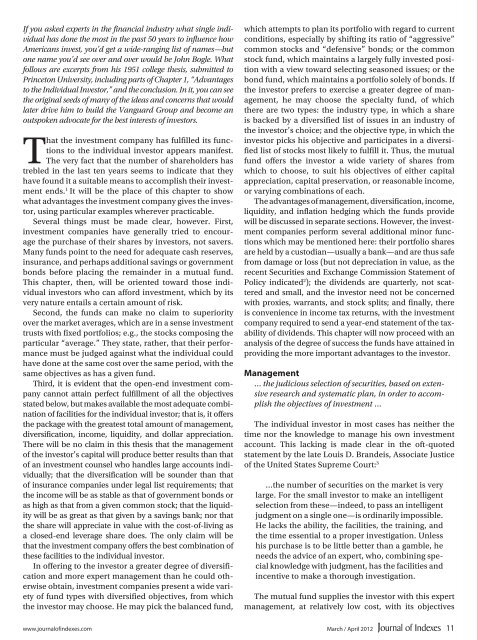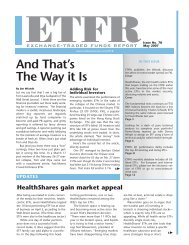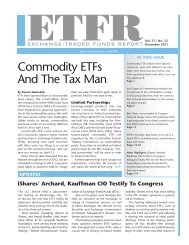You also want an ePaper? Increase the reach of your titles
YUMPU automatically turns print PDFs into web optimized ePapers that Google loves.
If you asked experts in <strong>the</strong> financial industry what single individual<br />
has done <strong>the</strong> most in <strong>the</strong> past 50 years to influence how<br />
Americans invest, you’d get a wide-ranging list of names—but<br />
one name you’d see over and over would be John Bogle. What<br />
follows are excerpts from his 1951 college <strong>the</strong>sis, submitted to<br />
Princeton University, including parts of Chapter 1, “Advantages<br />
to <strong>the</strong> Individual Investor,” and <strong>the</strong> conclusion. In it, you can see<br />
<strong>the</strong> original seeds of many of <strong>the</strong> ideas and concerns that would<br />
later drive him to build <strong>the</strong> Vanguard Group and be<strong>com</strong>e an<br />
outspoken advocate for <strong>the</strong> best interests of investors.<br />
That <strong>the</strong> investment <strong>com</strong>pany has fulfilled its functions<br />
to <strong>the</strong> individual investor appears manifest.<br />
The very fact that <strong>the</strong> number of shareholders has<br />
trebled in <strong>the</strong> last ten years seems to indicate that <strong>the</strong>y<br />
have found it a suitable means to ac<strong>com</strong>plish <strong>the</strong>ir investment<br />
ends. 1 It will be <strong>the</strong> place of this chapter to show<br />
what advantages <strong>the</strong> investment <strong>com</strong>pany gives <strong>the</strong> investor,<br />
using particular examples wherever practicable.<br />
Several things must be made clear, however. First,<br />
investment <strong>com</strong>panies have generally tried to encourage<br />
<strong>the</strong> purchase of <strong>the</strong>ir shares by investors, not savers.<br />
Many funds point to <strong>the</strong> need for adequate cash reserves,<br />
insurance, and perhaps additional savings or government<br />
bonds before placing <strong>the</strong> remainder in a mutual fund.<br />
This chapter, <strong>the</strong>n, will be oriented toward those individual<br />
investors who can afford investment, which by its<br />
very nature entails a certain amount of risk.<br />
Second, <strong>the</strong> funds can make no claim to superiority<br />
over <strong>the</strong> market averages, which are in a sense investment<br />
trusts with fixed portfolios; e.g., <strong>the</strong> stocks <strong>com</strong>posing <strong>the</strong><br />
particular “average.” They state, ra<strong>the</strong>r, that <strong>the</strong>ir performance<br />
must be judged against what <strong>the</strong> individual could<br />
have done at <strong>the</strong> same cost over <strong>the</strong> same period, with <strong>the</strong><br />
same objectives as has a given fund.<br />
Third, it is evident that <strong>the</strong> open-end investment <strong>com</strong>pany<br />
cannot attain perfect fulfillment of all <strong>the</strong> objectives<br />
stated below, but makes available <strong>the</strong> most adequate <strong>com</strong>bination<br />
of facilities for <strong>the</strong> individual investor; that is, it offers<br />
<strong>the</strong> package with <strong>the</strong> greatest total amount of management,<br />
diversification, in<strong>com</strong>e, liquidity, and dollar appreciation.<br />
There will be no claim in this <strong>the</strong>sis that <strong>the</strong> management<br />
of <strong>the</strong> investor’s capital will produce better results than that<br />
of an investment counsel who handles large accounts individually;<br />
that <strong>the</strong> diversification will be sounder than that<br />
of insurance <strong>com</strong>panies under legal list requirements; that<br />
<strong>the</strong> in<strong>com</strong>e will be as stable as that of government bonds or<br />
as high as that from a given <strong>com</strong>mon stock; that <strong>the</strong> liquidity<br />
will be as great as that given by a savings bank; nor that<br />
<strong>the</strong> share will appreciate in value with <strong>the</strong> cost-of-living as<br />
a closed-end leverage share does. The only claim will be<br />
that <strong>the</strong> investment <strong>com</strong>pany offers <strong>the</strong> best <strong>com</strong>bination of<br />
<strong>the</strong>se facilities to <strong>the</strong> individual investor.<br />
In offering to <strong>the</strong> investor a greater degree of diversification<br />
and more expert management than he could o<strong>the</strong>rwise<br />
obtain, investment <strong>com</strong>panies present a wide variety<br />
of fund types with diversified objectives, from which<br />
<strong>the</strong> investor may choose. He may pick <strong>the</strong> balanced fund,<br />
which attempts to plan its portfolio with regard to current<br />
conditions, especially by shifting its ratio of “aggressive”<br />
<strong>com</strong>mon stocks and “defensive” bonds; or <strong>the</strong> <strong>com</strong>mon<br />
stock fund, which maintains a largely fully invested position<br />
with a view toward selecting seasoned <strong>issue</strong>s; or <strong>the</strong><br />
bond fund, which maintains a portfolio solely of bonds. If<br />
<strong>the</strong> investor prefers to exercise a greater degree of management,<br />
he may choose <strong>the</strong> specialty fund, of which<br />
<strong>the</strong>re are two types: <strong>the</strong> industry type, in which a share<br />
is backed by a diversified list of <strong>issue</strong>s in an industry of<br />
<strong>the</strong> investor’s choice; and <strong>the</strong> objective type, in which <strong>the</strong><br />
investor picks his objective and participates in a diversified<br />
list of stocks most likely to fulfill it. Thus, <strong>the</strong> mutual<br />
fund offers <strong>the</strong> investor a wide variety of shares from<br />
which to choose, to suit his objectives of ei<strong>the</strong>r capital<br />
appreciation, capital preservation, or reasonable in<strong>com</strong>e,<br />
or varying <strong>com</strong>binations of each.<br />
The advantages of management, diversification, in<strong>com</strong>e,<br />
liquidity, and inflation hedging which <strong>the</strong> funds provide<br />
will be discussed in separate sections. However, <strong>the</strong> investment<br />
<strong>com</strong>panies perform several additional minor functions<br />
which may be mentioned here: <strong>the</strong>ir portfolio shares<br />
are held by a custodian—usually a bank—and are thus safe<br />
from damage or loss (but not depreciation in value, as <strong>the</strong><br />
recent Securities and Exchange Commission Statement of<br />
Policy indicated 2 ); <strong>the</strong> dividends are quarterly, not scattered<br />
and small, and <strong>the</strong> investor need not be concerned<br />
with proxies, warrants, and stock splits; and finally, <strong>the</strong>re<br />
is convenience in in<strong>com</strong>e tax returns, with <strong>the</strong> investment<br />
<strong>com</strong>pany required to send a year-end statement of <strong>the</strong> taxability<br />
of dividends. This chapter will now proceed with an<br />
analysis of <strong>the</strong> degree of success <strong>the</strong> funds have attained in<br />
providing <strong>the</strong> more important advantages to <strong>the</strong> investor.<br />
Management<br />
… <strong>the</strong> judicious selection of securities, based on extensive<br />
research and systematic plan, in order to ac<strong>com</strong>plish<br />
<strong>the</strong> objectives of investment …<br />
The individual investor in most cases has nei<strong>the</strong>r <strong>the</strong><br />
time nor <strong>the</strong> knowledge to manage his own investment<br />
account. This lacking is made clear in <strong>the</strong> oft-quoted<br />
statement by <strong>the</strong> late Louis D. Brandeis, Associate Justice<br />
of <strong>the</strong> United States Supreme Court: 3<br />
…<strong>the</strong> number of securities on <strong>the</strong> market is very<br />
large. For <strong>the</strong> small investor to make an intelligent<br />
selection from <strong>the</strong>se—indeed, to pass an intelligent<br />
judgment on a single one—is ordinarily impossible.<br />
He lacks <strong>the</strong> ability, <strong>the</strong> facilities, <strong>the</strong> training, and<br />
<strong>the</strong> time essential to a proper investigation. Unless<br />
his purchase is to be little better than a gamble, he<br />
needs <strong>the</strong> advice of an expert, who, <strong>com</strong>bining special<br />
knowledge with judgment, has <strong>the</strong> facilities and<br />
incentive to make a thorough investigation.<br />
The mutual fund supplies <strong>the</strong> investor with this expert<br />
management, at relatively low cost, with its objectives<br />
www.journalofindexes.<strong>com</strong> March / April 2012 11
















